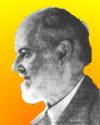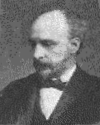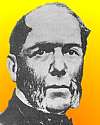 | TODAY IN SCIENCE HISTORY
NEWSLETTER - 27 MARCH |
 On 27 Mar 1829, the Zoological Society of London received a Royal Charter from George IV. It became Britain's first scientific zoo. By 1831, the royal managerie had been presented by King William IV to the society. In 1847, the general public were first admitted as paying visitors to provide funding for the zoo. On 27 Mar 1829, the Zoological Society of London received a Royal Charter from George IV. It became Britain's first scientific zoo. By 1831, the royal managerie had been presented by King William IV to the society. In 1847, the general public were first admitted as paying visitors to provide funding for the zoo.
More history of the zoo can be read in this article on the Zoological Society of London written for its Centenary.
|
 On 27 Mar 1863, Henry Royce was born. Today's Science Store pick is The Magic of a Name: The Rolls-Royce Story, Part One: The First Forty Years by Peter Pugh. The book begins with the meeting of Henry Royce and Charles Rolls in May 1904, and describes the historical development of the company they formed. At the outset of World War I, Royce turned to the production of a reliable engine for aviation. Thus began the name associated today with prestigious cars and jet engines. New: $ On 27 Mar 1863, Henry Royce was born. Today's Science Store pick is The Magic of a Name: The Rolls-Royce Story, Part One: The First Forty Years by Peter Pugh. The book begins with the meeting of Henry Royce and Charles Rolls in May 1904, and describes the historical development of the company they formed. At the outset of World War I, Royce turned to the production of a reliable engine for aviation. Thus began the name associated today with prestigious cars and jet engines. New: $50.00. Save 27% Price $36.50. Available Used from $0.59 (as of time of writing). Yesterday's pick: Count Rumford on the Nature of Heat, by Benjamin Rumford.
For picks from earlier newsletters, see the Today in Science Science Store home page. | |
 | "All great scientists have, in a certain sense, been great artists; the man with no imagination may collect facts, but he cannot make great discoveries."
- Karl Pearson, English mathematician (born 27 Mar 1857)  |
 | As the engines fired on the first space launch of a man into space, he shouted: "Poyekhali!" - "Let's Go!" - Soviet cosmonaut in the quiz below, (born 27 Mar 1968)  |

| "Dewar's rule in his laboratory was as absolute as that of a Pharaoh, and he showed deference to no one except the ghost of Faraday whom he met occasionally all night in the gallery behind the lecture room."
- Kurt Alfred Georg Mendelssohn, author, describing Sir James Dewar, Scottish chemist and physicist (died 27 Mar 1923)  |
| Before you look at today's web page, see if you can answer some of these questions about the events that happened on this day. Some of the names are very familiar. Others will likely stump you. Tickle your curiosity with these questions, then check your answers on today's web page. |
 |  Wilhelm Conrad R�ntgen, born 27 Mar 1845, received the first Nobel Prize for Physics in 1901. Wilhelm Conrad R�ntgen, born 27 Mar 1845, received the first Nobel Prize for Physics in 1901.  What was the discovery for which he was recognized? What was the discovery for which he was recognized? |
 |  A Russian cosmonaut (1934-1968) was the first man to travel in space. The Soviet Vostok 1 spacecraft in which he travelled on 12 Apr 1961 orbited the Earth once in 1 hour 29 minutes at a maximum altitude of 187 miles (301 km). He was 27 years old, and this was his only trip into space, after which he trained other cosmonauts. His early death, seven years later, resulted from the crash of his jet aircraft while on a routine training flight. A Russian cosmonaut (1934-1968) was the first man to travel in space. The Soviet Vostok 1 spacecraft in which he travelled on 12 Apr 1961 orbited the Earth once in 1 hour 29 minutes at a maximum altitude of 187 miles (301 km). He was 27 years old, and this was his only trip into space, after which he trained other cosmonauts. His early death, seven years later, resulted from the crash of his jet aircraft while on a routine training flight.  Can you name this first man in space? Can you name this first man in space? |
 |  A British chemist and physicist (1842-1923) studied of low-temperature phenomena, for which he designed a double-walled vacuum flask which continues to be known by his name. A British chemist and physicist (1842-1923) studied of low-temperature phenomena, for which he designed a double-walled vacuum flask which continues to be known by his name.  Can you name this scientist? Can you name this scientist? |
 |  On 27 Mar 1933, a new plastic was discovered by Reginald Gibson and Eric William Fawcett, which became one of the earliest plastics to come into common use. It was discovered by accident while reacting ethylene and benzaldehyde at high pressure. On 27 Mar 1933, a new plastic was discovered by Reginald Gibson and Eric William Fawcett, which became one of the earliest plastics to come into common use. It was discovered by accident while reacting ethylene and benzaldehyde at high pressure.
 What plastic was discovered by Gibson and Fawcett? What plastic was discovered by Gibson and Fawcett? |

|  On 27 Mar1855, Abraham Gesner received the first U.S. patent for a process to obtain a certain oil product from bituminous shale and cannel coal. The light volatile liquid obtained was popular for the purpose of illumination as a fuel in lamps. On 27 Mar1855, Abraham Gesner received the first U.S. patent for a process to obtain a certain oil product from bituminous shale and cannel coal. The light volatile liquid obtained was popular for the purpose of illumination as a fuel in lamps.
 What name did he give to this fuel? |
When you have your answers ready to all the questions above, you'll find all the information to check them, and more, on the March 27 web page of Today in Science History. Or, try this link first for just the brief answers.
Fast answers for the previous newsletter for March 26: Heat as a liquid form of matter; washing machine; Cadillac; the moon orbits an asteroid (Ida); Dr. Jonas Salk. |
 If you enjoy this newsletter, the website, or wish to offer encouragement or ideas, please send feedback by using your mail reader Reply button. If you enjoy this newsletter, the website, or wish to offer encouragement or ideas, please send feedback by using your mail reader Reply button. |
--
If you do not want to receive any more newsletters,
Unsubscribe To update your preferences and to unsubscribe visit
this link 


 On 27 Mar 1829, the Zoological Society of London received a Royal Charter from George IV. It became Britain's first scientific zoo. By 1831, the royal managerie had been presented by King William IV to the society. In 1847, the general public were first admitted as paying visitors to provide funding for the zoo.
On 27 Mar 1829, the Zoological Society of London received a Royal Charter from George IV. It became Britain's first scientific zoo. By 1831, the royal managerie had been presented by King William IV to the society. In 1847, the general public were first admitted as paying visitors to provide funding for the zoo.



 Wilhelm Conrad R�ntgen, born 27 Mar 1845, received the first Nobel Prize for Physics in 1901.
Wilhelm Conrad R�ntgen, born 27 Mar 1845, received the first Nobel Prize for Physics in 1901.  What was the discovery for which he was recognized?
What was the discovery for which he was recognized?
 A Russian cosmonaut (1934-1968) was the first man to travel in space. The Soviet Vostok 1 spacecraft in which he travelled on 12 Apr 1961 orbited the Earth once in 1 hour 29 minutes at a maximum altitude of 187 miles (301 km). He was 27 years old, and this was his only trip into space, after which he trained other cosmonauts. His early death, seven years later, resulted from the crash of his jet aircraft while on a routine training flight.
A Russian cosmonaut (1934-1968) was the first man to travel in space. The Soviet Vostok 1 spacecraft in which he travelled on 12 Apr 1961 orbited the Earth once in 1 hour 29 minutes at a maximum altitude of 187 miles (301 km). He was 27 years old, and this was his only trip into space, after which he trained other cosmonauts. His early death, seven years later, resulted from the crash of his jet aircraft while on a routine training flight.  Can you name this first man in space?
Can you name this first man in space? 
 A British chemist and physicist (1842-1923) studied of low-temperature phenomena, for which he designed a double-walled vacuum flask which continues to be known by his name.
A British chemist and physicist (1842-1923) studied of low-temperature phenomena, for which he designed a double-walled vacuum flask which continues to be known by his name.  Can you name this scientist?
Can you name this scientist? 
 On 27 Mar 1933, a new plastic was discovered by Reginald Gibson and Eric William Fawcett, which became one of the earliest plastics to come into common use. It was discovered by accident while reacting ethylene and benzaldehyde at high pressure.
On 27 Mar 1933, a new plastic was discovered by Reginald Gibson and Eric William Fawcett, which became one of the earliest plastics to come into common use. It was discovered by accident while reacting ethylene and benzaldehyde at high pressure. What plastic was discovered by Gibson and Fawcett?
What plastic was discovered by Gibson and Fawcett? 
 On 27 Mar1855, Abraham Gesner received the first U.S. patent for a process to obtain a certain oil product from bituminous shale and cannel coal. The light volatile liquid obtained was popular for the purpose of illumination as a fuel in lamps.
On 27 Mar1855, Abraham Gesner received the first U.S. patent for a process to obtain a certain oil product from bituminous shale and cannel coal. The light volatile liquid obtained was popular for the purpose of illumination as a fuel in lamps. What name did he give to this fuel?
What name did he give to this fuel?  If you enjoy this newsletter, the website, or wish to offer encouragement or ideas, please send feedback by using your mail reader Reply button.
If you enjoy this newsletter, the website, or wish to offer encouragement or ideas, please send feedback by using your mail reader Reply button. 

Δεν υπάρχουν σχόλια:
Δημοσίευση σχολίου